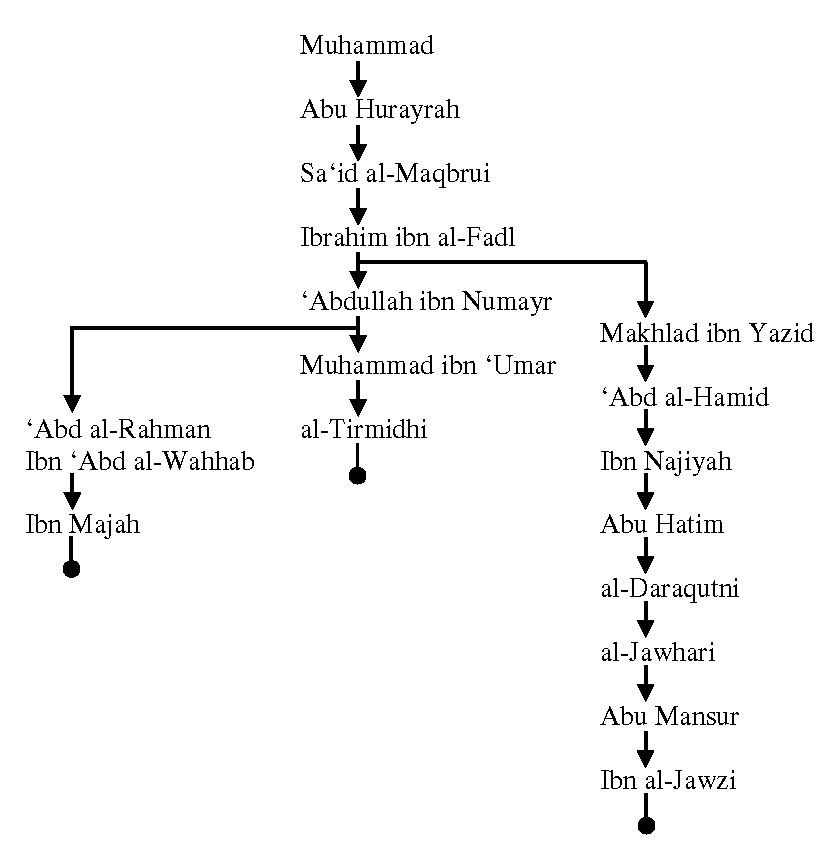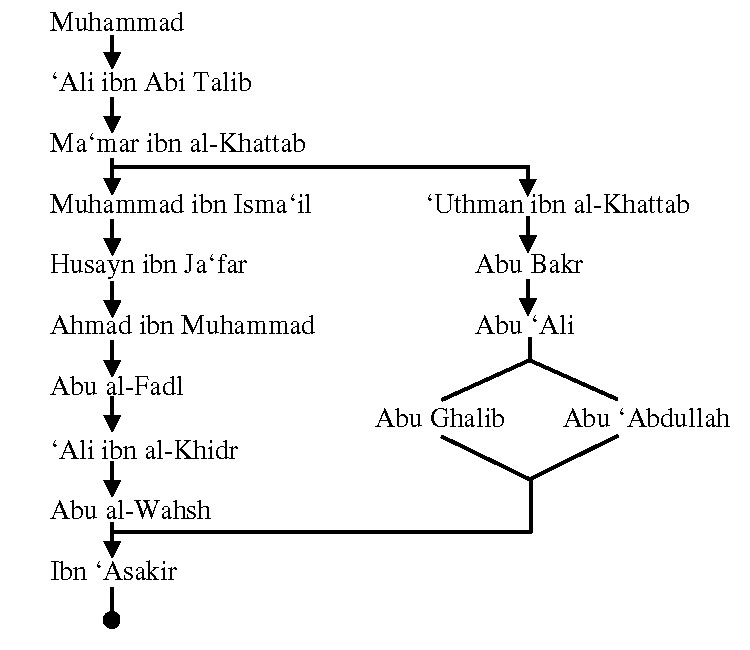|
I Introduction
There are narratives that report that words of wisdom are the
lost heritage of a true believer and that wherever he finds
them, he is more worthy of them.
In this article their ascription to the Prophet (sws ) will be
critically evaluated.
II Texts and their Analysis
The following two companions report this narrative from the
Prophet (sws).
1. Abu Hurayrah (rta)
حَدَّثَنَا مُحَمَّدُ بْنَ عُمَرَ بْنِ الْوَلِيدِ الْكِنْدِيُّ
حَدَّثَنَا عَبْدُ اللّٰهِ بْنُ نُمَيْرٍ عَنْ اَبْرَاهِيْمَ
بْنِ الْفَضْلِ عَنْ سَعِيْدٍ الْمَقْبُرِيِّ عَنْ اَبِي
هُرَيْرَةَ قَالَ قَالَ رَسُوْلُ اللّٰهِ صَلَّي اللّٰهُ عَلَیۡهِ
وَسَلَّمَ الْكَلِمَةُ الْحِكْمَةُ ضَالَّةُ الْمُؤْمِنِ
فَحَيْثُ وَجَدَهَا فَهُوَ اَحَقُّ بِهَا
Abu Hurayrah stated: “God’s messenger said: ‘Words of wisdom
are the lost heritage of a true believer. Thus wherever he
finds them, he is more worthy of them.”
Following is the schematic illustration of the isnad of this
narrative’s variants:

Following is the jarh recorded by al-Mizzi on Ibrahim ibn al-Fadl:
Ahmad ibn Hanbal says that he is da‘if laysa bi qawi fi al-hadith;
Yahya ibn Ma‘in says: laysa hadithuhu bi shayy; Abu Zur‘ah
regards him to be da‘if; Abu Hatim’s opinion about him is
da‘if al-hadith munkar al-hadith; Al-Bukhari regards him to be
munkar al-hadith; Al-Tirmidhi says yud‘‘afu fi al-hadith; in
the opinion of al-Nasa’i, he is munkar al-hadith; at another
place, he says that he is laysa bi thiqah wa la yuktabu
hadithuhu; Al-Hakim records that he is laysa bi al-qawi
‘indahum; Ibn ‘Adi says that in spite of his du‘f his
narratives can be written for corroboration and to him it is
not permitted to adduce from him.
Ibn Hibban says that he is fahish al-khata’.
Ibn Hajar calls him matruk.
He records that al-Saji regards him to be among the du‘afa’
and that al-Azdi and al-Daraqutni opine that he is matruk and
al-‘Uqayli regards the narrative under discussion to be among
his manakir.
2. ‘Ali ibn Abi Talib (rta)
قرأت بخط علي بن الخضر
السلمي وأنبأنيه أبو الوحش سبيع بن المسلم المقرىء ثنا علي بن
الخضر بن سليمان بن سعيد السلمي لفظا سنة اثنتين وأربعين
وأربعمائة في الجامع بدمشق ثنا الشيخ أبو الفضل محمد بن محمد بن
عيسي بن محمد الإسفرايني قدم علينا دمشق رحمه اللّٰه حدثنا أحمد
بن محمد بن الحسين الشيرازي قال سمعت الحسين بن جعفر بن محمد
الجرجاني الحافظ بالري يقول سمعت محمد بن إسماعيل بن هزان
الطبراني بمكة قال سمعت معمر بن الخطاب بن عبد الله البلوي بمكة
قال سمعت علي بن أبي طالب يقول سمعت رسول اللّٰه صلي اللّٰه
عليه وسلم يقول كلمة الحكمة ضالة المؤمن حيث وجدها فهو أحق بها
‘Ali stated: “I heard God’s messenger say: ‘Words of wisdom
are the lost heritage of a true believer. Thus wherever he
finds them, he is more worthy of them.”
Following is the schematic illustration of the isnad of this
narrative’s variants:

As mentioned by Ibn ‘Asakir, the person who actually narrates
from ‘Ali (rta) is ‘Uthman ibn al-Khattab (d. 327 AH) and not
Ma‘mar ibn al-Khattab: (قال ابن عساكر كذا
سمى الأشج أبا الدنيا والمحفوظ أن اسمه عثمان بن الخطاب).
About him, Ibn al-Jawzi records that Abu Bakr al-Khatib says
that his words lack veracity and his narratives should not be
adduced from.
Al-Dhahabi says that he has narrated from ‘Ali (rta) and there
is a gap of three hundred years between the two; scholars
regard him to be a liar.
Ibn Kathir states that it is said that he has narrated a
written collection from ‘Ali (rta); however, most scholars of
the past and present regard this written collection to be a
fabrication. These scholars include Abu Tahir al-Salafi, Ibn
Taymiyah, al-Mizzi and al-Dhahabi.
III Conclusion
It can be concluded on the basis of the above information that
the ascription of this narrative to the Prophet (sws) cannot
be reliably established.
ـــــــــــــــــــــــــ
|